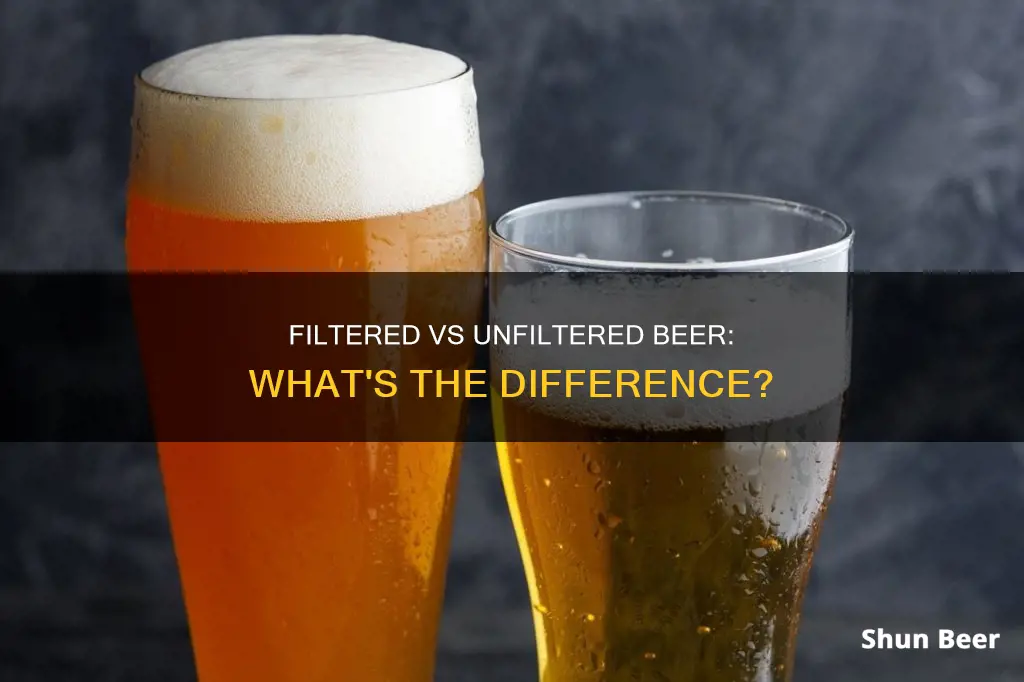
Beer lovers are divided into two camps: those who prefer the crisp, clean taste of filtered beer, and those who opt for the more flavourful, aromatic experience of unfiltered beer. The main difference between the two is the finishing process: filtered beer goes through a filtration process to remove yeast and any leftover malt, barley, or hops from the brewing process, while unfiltered beer does not, leaving remnants of these ingredients in the final product.
What You'll Learn

Unfiltered beers are considered to be incomplete or unfinished
Unfiltered beers were historically thought to be dirty, unclean, or unfinished due to their cloudy and hazy appearance. In the early days of American craft brewing, crystal clear pilsners and lagers were considered the standard of quality and the most visually appealing. However, the heavy filtration required to achieve this clarity comes at the cost of flavour and aroma complexity.
By skipping the filtration process, unfiltered beers retain a richer flavour and aroma profile. They are considered to have a stronger fragrance than filtered beers due to the presence of yeast and malt, which are lost during filtration, resulting in a more subtle and softer aroma.
Unfiltered beers also offer a grittier texture and a more bitter taste with hints of various flavours. In contrast, filtered beers are known for their smooth, sharp, clean, and crisp texture. The preference for either style depends on individual taste and texture preferences.
Additionally, unfiltered beers are believed to be healthier options. Yeast contains vitamin B, which helps reduce hangover symptoms, and unfiltered beer is also higher in fibre compared to its filtered counterpart.
Oklahoma Beer: Unique Taste or Marketing Ploy?
You may want to see also

Filtration methods vary depending on the style of beer
The filtration methods used to brew beer vary depending on the style of beer. The type of filtration method used depends on factors such as the desired clarity, the type of beer being produced, and the size of the brewing operation.
One common method is surface filtration, which uses filter sheets or cartridges made from materials like cellulose, perlite, or diatomaceous earth. These filters have minuscule pores that trap and retain particles, allowing clear beer to pass through. Surface filtration is perfect for removing larger particles and is most effective when the beer has already undergone some degree of clarification, such as settling or centrifugation.
Another method is cake filtration, where a "cake" of filter aid, such as diatomaceous earth or perlite, is built up on the surface of a filter screen. As the beer passes through the cake, particles are trapped within the filter aid, resulting in a clear product. This method is excellent for polishing beer and removing finer particles but can be labour-intensive and challenging to scale up for larger operations.
Cold filtering is another popular method, especially among larger breweries. This process involves chilling the beer to near-freezing temperatures, causing haze-causing proteins and polyphenols to clump together and settle out. The beer is then passed through a filter to remove these larger particles. Cold filtering is highly effective at removing haze-causing compounds and easily scalable, but it may strip some flavour compounds, resulting in a less complex taste profile.
Other filtration methods include pressure leaf filters, plate and frame filters, lenticular disc filters, membrane filters, and tangential flow (cross-flow) filters. These systems use different filter media and can be combined to achieve the desired clarity and stability in the beer.
The choice of filtration method can have a significant impact on the appearance, flavour, aroma, consistency, and shelf life of the final product. Proper filtration can enhance the visual appeal of the beer, eliminate off-flavours or undesirable aromas, extend shelf life by reducing spoilage, and ensure consistency from batch to batch.
German Beer Imports: Different or Just Marketing?
You may want to see also

Unfiltered beers have a stronger aroma
Unfiltered beers, on the other hand, retain the yeast and malt, which gives them a stronger and more complex aroma. This is one of the reasons why unfiltered beers, such as hazy IPAs, have become so popular in recent years. The strong aroma of unfiltered beers adds to their overall sensory experience.
The misconception that unfiltered beers are dirty or unfinished due to their cloudy appearance has been dispelled, and they are now appreciated for their unique characteristics. The striking opaque, orange-yellow liquid of a hazy New England IPA, for example, has become a favourite among craft beer enthusiasts.
The difference in aroma between filtered and unfiltered beers is primarily due to the presence or absence of yeast and malt, which are filtered out in the former but retained in the latter. This difference in the production process results in a noticeable contrast in the fragrance and overall sensory experience of the two types of beers.
In addition to a stronger aroma, unfiltered beers also offer a more complex flavour profile and a softer mouthfeel compared to filtered beers. The presence of yeast, hops, and barley in unfiltered beers contributes to their bitterness and grainy texture, providing a unique sensory experience that is favoured by many beer enthusiasts.
Beer Brats: A Unique Twist on a Classic
You may want to see also

Filtered beers are stable, so all conditioning has stopped
Filtration plays a crucial role in the brewing process, and filtered beers possess distinctive characteristics that set them apart from their unfiltered counterparts. One of the defining features of filtered beers is their stability, which means that all conditioning processes have ceased. This stability has several implications for the final product and is a key differentiator between filtered and unfiltered beers.
Filtered beers, by definition, have undergone a process to remove sediment and other particles left over from brewing. This can be achieved through various techniques, including surface filtration and cake filtration, which employ filters ranging from rough to fine or even sterile. Modern filtration methods, introduced in the 19th century, can remove all sediment, including yeast, resulting in a clear and stable product.
The stability of filtered beers means that they are considered "brewery-conditioned." This term is used to indicate that the conditioning process, which involves the removal of sediment and clarification of the beer, has been completed in the brewery itself. In contrast, unfiltered beers that remain in contact with yeast are known as "bottle-conditioned" or "cask-conditioned," as they continue to undergo conditioning even after bottling.
The stability of filtered beers has several advantages. Firstly, it ensures consistency in the final product, as there are no ongoing changes in flavour, appearance, or texture. This predictability is particularly important for mass-produced beers, where maintaining a uniform standard is essential. Secondly, filtered beers are often prized for their clarity and transparency. The removal of sediment and haze-causing particles results in a bright, clear beer that is aesthetically pleasing to many consumers.
However, it is worth noting that the stability of filtered beers also has a trade-off. The removal of yeast and other particles can lead to a loss of complexity in flavour and aroma. Unfiltered beers, which retain these compounds, often exhibit deeper flavours and a more pronounced aroma. As a result, some breweries are now choosing to forego filtration to enhance the character of their beers.
In summary, the stability of filtered beers signifies the cessation of conditioning processes, resulting in a consistent and clear product. While this stability has advantages in terms of consistency and appearance, it can also impact the flavour and aroma profile of the beer. Ultimately, the choice between filtered and unfiltered beers depends on the brewer's preference for clarity, stability, and flavour development.
Mixing Beers: Is It a Sin or a Win?
You may want to see also

Unfiltered beers are thought to be healthier
Unfiltered beer is any ale, lager, or fermented malt beverage that still contains the sediment left over from the brewing process. In the past, unfiltered beers were considered dirty or unfinished, but today they are among the most popular in craft beer and brewing. Unfiltered beers have a hazy, opaque appearance and are known for their complex flavours and aromas.
One of the main reasons why unfiltered beers are thought to be healthier is that they retain the yeast, which is a rich source of vitamins, minerals, and other beneficial compounds. For example, unfiltered beer can be a good source of vitamins B3, B6, and folic acid, as well as iron, protein, fibre, phosphates, and calcium. However, it is important to note that the alcohol in beer can inhibit the absorption of these B vitamins.
In addition to the nutritional benefits, unfiltered beer may also offer other health advantages. For instance, the alcohol content can raise good cholesterol (HDL) levels, and there is evidence that the silicon content may help prevent osteoporosis and reduce the risk of Alzheimer's disease.
Furthermore, unfiltered beers may have a softer mouthfeel compared to their filtered counterparts, which can contribute to a more pleasant drinking experience. This softness is particularly notable in American IPAs, where the unfiltered versions offer a less bitter, more balanced flavour profile.
While the health benefits of unfiltered beer are promising, it is important to consume it in moderation, as excessive beer consumption can negate any positive effects. Additionally, it is worth noting that the presence of live yeast in unfiltered beer may cause issues for individuals with yeast sensitivities or allergies.
Exploring the Diverse US Beer Scene
You may want to see also
Frequently asked questions
Filtered beer goes through a cleaning process to remove yeast and any leftover malt, barley, or hops from the brewing process. Unfiltered beer, on the other hand, does not undergo additional filtration before bottling, so it retains remnants of its ingredients.
When beer is filtered, it loses a little bit of its flavour each time. Unfiltered beers offer more complex flavours and aromas. They are also more bitter and have a grainy texture.
Unfiltered beers are cloudy, murky, and hazy. Over time, they have become appreciated for this appearance. Filtered beers are clear, clean, and sparkling.
Unfiltered beer is considered healthier because it contains more fibre, probiotics, and B vitamins. Yeast contains vitamin B, which helps to curtail hangover effects.
No, the filtration process does not affect the alcohol content of the beer.







